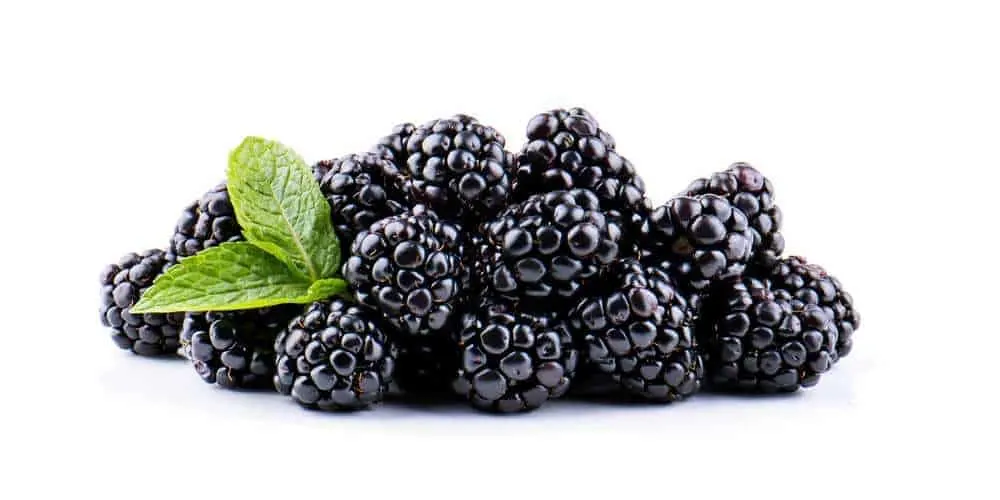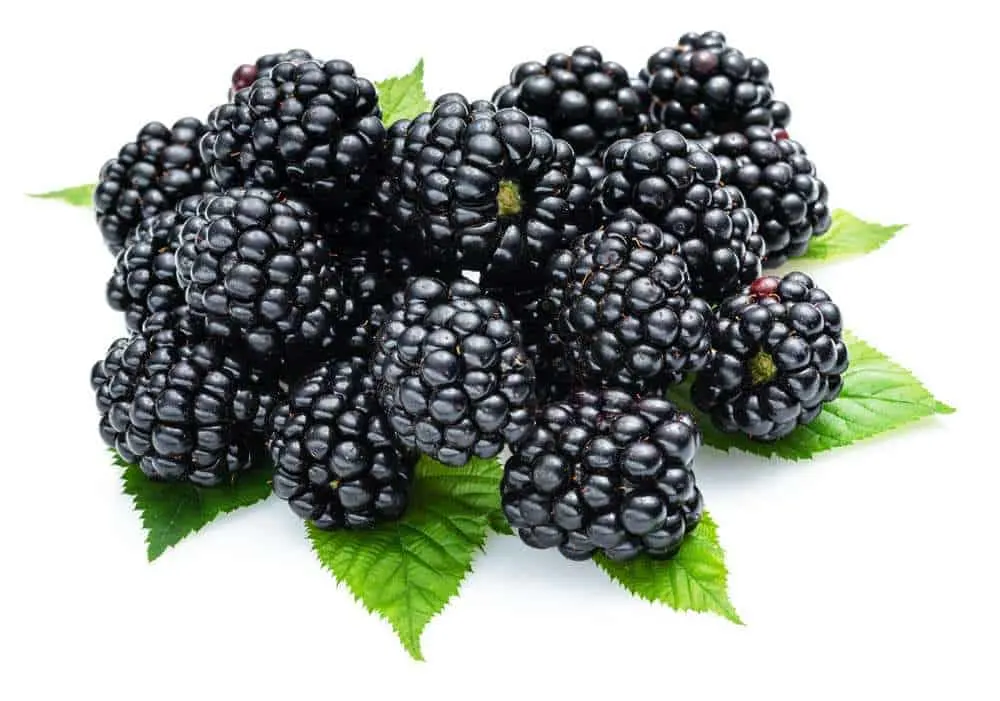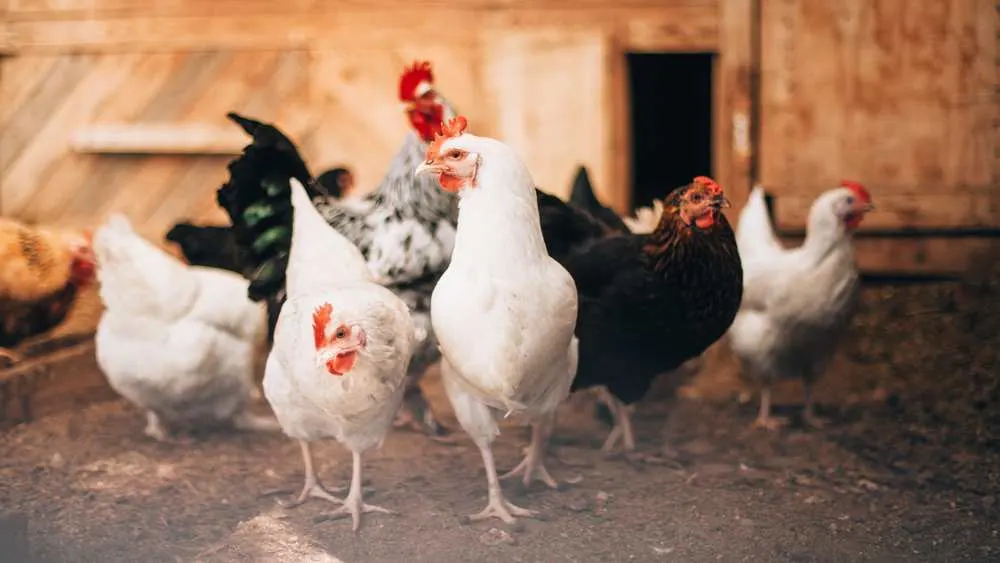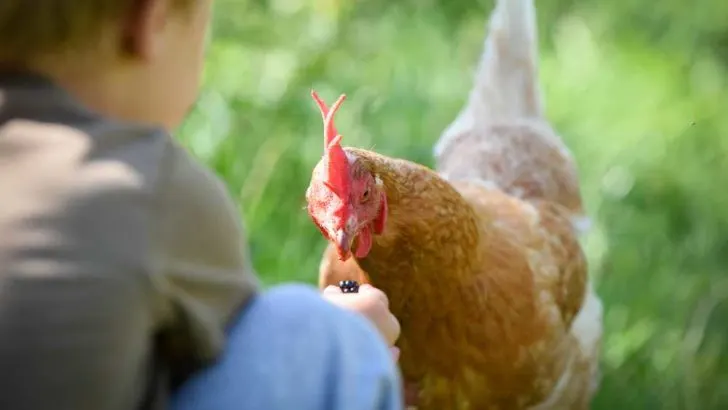If you are a chicken owner, you already know that chickens are pretty flexible when it comes to food from all house pets. On the other hand, they are birds. Thus, they are more fragile than animals like cats or dogs. Luckily there is not much food that can harm them fatally, if consumed in moderation, of course.
However, chickens are crazy about fruit in general; nothing makes them go bananas like this type of food. So today, I will talk about can chickens eat blackberries, and most importantly, how much and how often.
Let’s begin.

Can Chickens Eat Blackberries?
The answer is a big, fat YES! In fact, chickens adore blackberries, and there is a reason why – they are super sweet since they contain a high percentage of sugar.
We think lots of fruits are harmless to chickens and animals in general, but they can be fatal for them. For example, citrus fruits will negatively affect egg production, while avocadoes will cause significant respiratory problems that can end up fatally.
Berries are fully packed with beneficial nutrients, and they are as well very tasty and refreshing. So they make a perfect bite-size treat for your flock.
They’re soft and sweet and just right for your chickens since they can easily nibble on them and swallow them without any health risks. So blackberries are safe for your birds, but that is not all that they should eat. Serve berries as a treat and not as a meal.
Why Should You Feed Your Chickens Blackberries?
Blackberries are nutritional bombs, believe me, they contain such a good balance of vitamins, proteins, fats, and carbohydrates that ensure optimal health. They are specifically rich in Vitamin K and C and minerals like manganese.
Vitamins
Blackberries contain vitamins A and B. Vitamin A improves the eyesight of chickens, enhances overall health, and boosts egg production capabilities. In case there is not enough vitamin A in their diet, the egg production abilities are hampered.
A B-vitamin series prevents your chickens from suffering from several diseases like:
- Dermatitis
- Persis
- Bowed-legs
- Mouth cavity inflammation and lesions
- Poor feathering
- Fatty liver and kidney syndrome
- Hatchability problems
Vitamin K
Did you know that 100 grams of blackberries roughly contain 19.8 micrograms of Vitamin K? This is especially good for chickens since it plays a vital role in the blood clotting mechanism and bone metabolism and helps to keep health issues like Coccidiosis and hemorrhages away.
When there are too many blood spots in the egg, it’s a sign of Vitamin K deficiency.
Vitamin C
A 100 grams of blackberries contains almost 21 mg of vitamin C. This vitamin highly contributes to collagen formation in blood vessels, connective tissue, bones, and feathers which are very important for chickens.
Vitamin C also helps in regenerating skin and feathers, fights free radicals in the body, and helps in healing wounds. Do you need any better reason to include blackberries in your chick’s diet?
Manganese
Manganese is important for healthy bone development, formation of cartilage, eggshell formation, prevention of Persis, and boosting the immune system. A 100 grams of blackberries contains 0.64 mg of manganese.
Fibers
Fibers should make up about 10% of your bird’s diet every day, and the great news is that blackberries are loaded with fibers. A 100 grams of this fruit contains 5.3 gm of fiber. Fibers will keep your chickens’ gut in good condition by promoting healthy bowel movement; they will regulate blood sugar levels and obtain optimal levels of healthy gut bacteria.
Keep in mind that blackberries are a great treat but only in small amounts.

How Many Blackberries Should You Feed To Your Chickens?
Treats should not make more than 5-10% of a chicken’s overall diet. There are a few exceptions to this rule, such as greens that include kale and parsley that should make up more than 10% of your chickens’ diet.
For blackberries, up to 6 ounces of berries per chicken, a day will be more than enough. You should serve them in the morning since it is easier to digest, or afternoon after their meal. During summer, serve them frozen.
Just like with any other food feeding your chickens blackberries in excess will do more harm than good. The high sugar content will lead to obesity, so make sure you always keep the number of blackberries low. Also, scale the portion of blackberries for each chicken differently according to their size.
Apart from the quantity, there are some things you should keep in mind before you start giving your chickens blackberries.
Never serve them blackberries every day since chickens tend to get bored too quickly. Avoid serving moldy berries since these are high in toxins. Make sure that no pesticide gets into your chickens’ system with this fruit, so grow them personally or always wash them thoroughly.
Chickens are susceptible to pesticide poisoning and will fall sick immediately. The most common side effect of ingesting pesticides is diarrhea. Without immediate treatment, diarrhea can be life-threatening for poultry. Also, eating eggs from sick chicken can be harmful to humans, so make sure you are careful.
What about blackberry seeds? Are they harmful to your chicks?
Luckily, chickens can digest blackberry seeds with ease, and it won’t mess with their gut health. The seeds can help promote health in chickens since they are rich in omega-3 fats. These fats boost cardiovascular health and egg production. Seeds are as well high in protein and dietary fiber.
What’s The Right Age To Give Blackberries?
In the wild, hens introduce young chicks to treats when they are only a few days old. Usually, treats in the wild are in the form of bugs and greens. However, when you keep them on the border, it is recommended to wait until they are at least a week or two old.
It’s because chicks need to understand what’s proper food before being introduced to the treats, or else you will have a hard time feeding them.

Summary
It’s a daunting task to think about what food is safe and what food is dangerous for your chickens.
Luckily all types of berries are great and safe for chickens to consume. Blackberries grow in abundance between May to September, and it is good news to know that your chicks are safe eating them since there are a lot of possibilities that your flock may be eating them without you even knowing.
Without any doubt, blackberries are providing many health benefits to your flocks, like a wide variety of vitamins and minerals such as vitamin C and K and manganese.
These nutrients are enhancing the growth, provide healthy development and maintain the overall health of your birds in check.
On the other hand, you must consider the fact that blackberries can be addictive. Like all other animals, like the taste of some particular food, if your chickens are prone to developing preferences and stop eating other essential foods. This can cause problems since, this way, they will be missing out on other necessary nutrients.
So the best way to feed your flock with blackberries is from time to time in the form of treats.
Read Also: Can Chickens Eat Blueberries?


